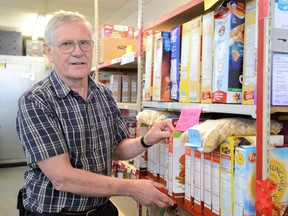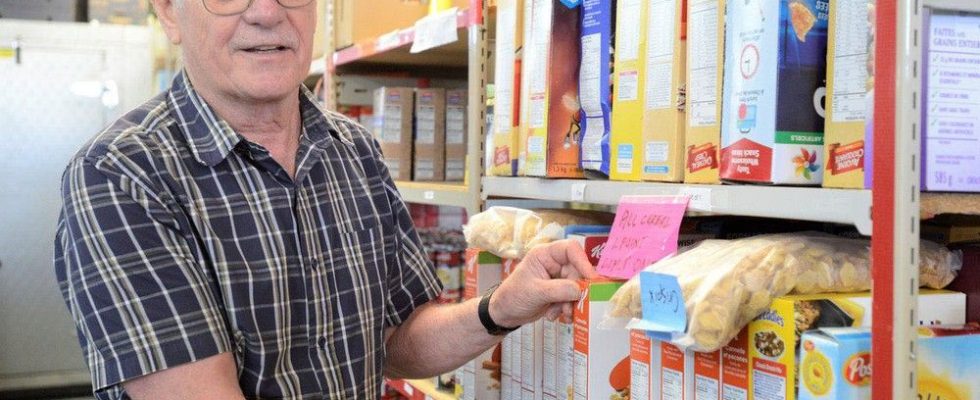Spike in need for service in Haldimand and Norfolk

Food banks in Haldimand, Norfolk and Six Nations are seeing new faces come through their doors as the high cost of groceries and housing leaves some residents unable to make ends meet.
“Normally we would only have one or two new registrations a month. Now we’re seeing eight or 10,” said Joy Quail, a family service worker with the Salvation Army, which runs a food bank on Broad Street East in Dunnville that serves more than 500 people every month.
The majority of clients are on social assistance programs like Ontario Works, “and that’s not stretching nearly far enough,” Quail said, adding the food bank is also “seeing more people with employment coming in.”
“It’s not that they’re using it for a long time. They’re using it to help get through a sticky situation,” she said of the latter group.
“It might be six months, or maybe even only three months.”
The increase in demand is similarly stark at the Six Nations Community Food Bank, according to Mary Monture, one of the community members who runs the food bank on Cao Lane.
Three years ago, Monture said, they would serve 40 to 50 people a week.
“We’re now up to anywhere from 200 to 250 — to 300 at times,” she said.
“There’s people who come who have paying jobs, but by the time they raise their kids and pay their bills, there’s not much left.”
The Simcoe Caring Cupboard saw usage drop during the COVID-19 pandemic, but there are now as many people who frequent the volunteer-run food bank on Kent Street as there were in 2019.
But numbers have not risen as sharply as seen in larger centers like Hamilton and Toronto, where last month the Daily Bread Food Bank reported that usage had hit a 40-year high.
Administrator Al Marten attributes the slower growth in Simcoe to the fact that the Caring Cupboard still requires prospective clients to show proof of financial need, a process known as means testing.
“We’re a food bank. We’re not a free grocery store. If you’re not screening your clients, I’m sorry, people are going to start taking advantage of you,” Marten said.
“If you can get $200 worth of groceries at a food bank, which our clients are walking out with, why would you go to a grocery store and buy it?”
Marten said some people trying to register for the food bank cite a lack of money, but he finds out during the interview process that they recently bought luxury vehicles or have pricey cellphone plans.
“To me, buying a brand new pickup truck is not a legitimate expense,” Marten said, adding that he still enrolls people who need immediate help, but also offers financial counseling.
“We work with them and put a plan together” to get them out of debt, he said.
“As long as they make the payments, we let them come here till they get out of a bind. I want to empower people, not just enable people.”
Such situations are the exception, Marten added, noting that most of the 120 people who use the Caring Cupboard “have been here for years,” while Ukrainian refugees and international students have been among the newer faces.
Means testing, he said, reassures donors that their dollars — and the food donated by local grocery stores and farms — are helping those in direst need. To Marten, food banks that serve anyone who turns up — no questions asked — fail the accountability test.
“You’re feeding the wrong people, and you’re hurting the ones who really need it,” he said.
At the Salvation Army in Dunnville, Quail said fraud is unlikely since food bank staff know their recurring clients well, and “less than one per cent” of clients would be responsible for any attempted abuse of the system.
“And we address that as it comes up,” she said.
“We do an intake and a survey, but we don’t do any means testing. Our philosophy is if you’re brave enough to come to the door to ask for help and get food, then you probably need it.”
The food bank on Six Nations is open to any on-reserve band members, with Monture saying that to ask prospective clients “a lot of questions” could discourage them from seeking assistance.
“It’s a very, very hard thing to walk through a door of a food bank and ask for help,” she said.
“It takes a lot of courage to say you can’t manage on your own.”
JP Antonacci is a Local Journalism Initiative Reporter based at the Hamilton Spectator. The initiative is funded by the Government of Canada.

Comments
Postmedia is committed to maintaining a lively but civil forum for discussion and encourages all readers to share their views on our articles. Comments may take up to an hour for moderation before appearing on the site. We ask you to keep your comments relevant and respectful. We have enabled email notifications—you will now receive an email if you receive a reply to your comment, there is an update to a comment thread you follow or if a user you follow comments. Visit our Community Guidelines for more information and details on how to adjust your email settings.
Join the Conversation